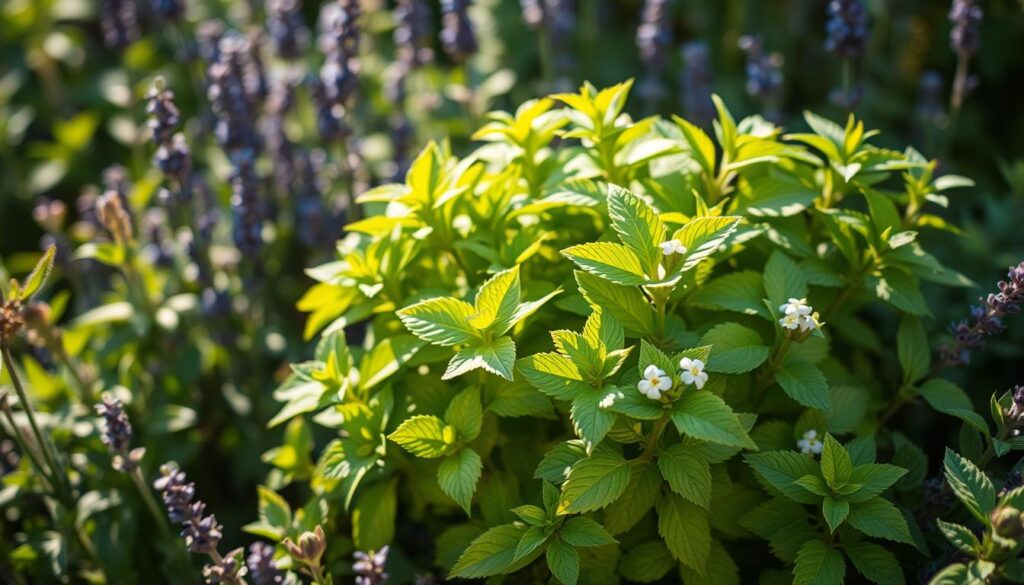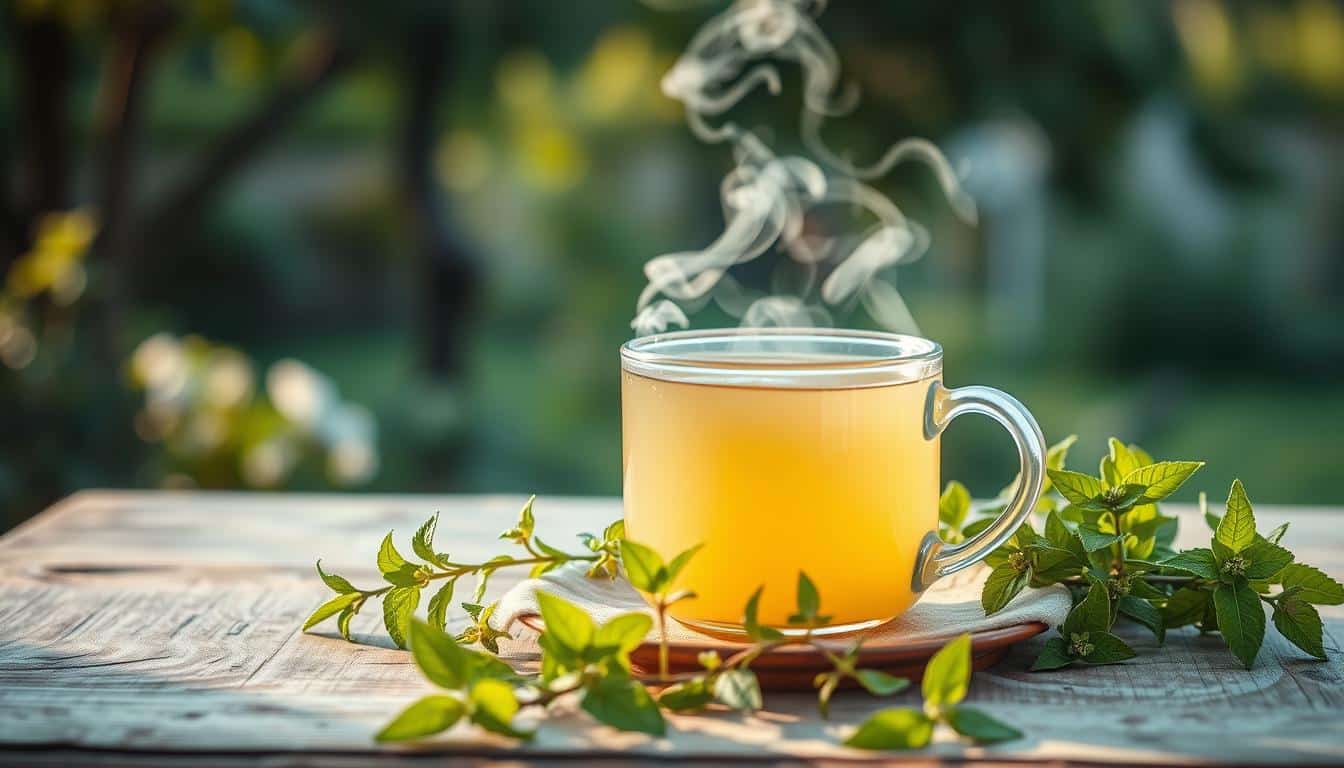Lemon Balm Tea Is The Best Stress Relief Drink
Looking for a natural way to fight stress and anxiety? Lemon balm tea might be your best bet. This herbal tea has been loved for centuries as a top stress-reliever. It can really improve your mental health.
Lemon balm tea comes from the Melissa officinalis plant. It offers a calming experience that’s different from usual ways to relax. Its light citrus taste and soothing effects make it great for managing stress naturally.
First grown in southern Europe and the Mediterranean, lemon balm tea is now known worldwide for its healing powers. It’s perfect for anyone facing daily stress or just needs a calm moment. This herbal tea is a gentle yet effective way to handle stress.
Key Takeaways
- Lemon balm tea is a natural stress relief drink
- Originates from Mediterranean and European regions
- Offers gentle anxiety management
- Contains calming botanical properties
- Supports mental wellness naturally
Understanding Lemon Balm: The Mediterranean Stress-Relieving Herb
Lemon balm is a special herb from the mint family. It has been loved by healers for centuries. This plant is known for its natural healing powers and rich history.

Origins and Historical Uses
Lemon balm comes from the Mediterranean. It was valued for its healing since ancient times. Greek and Roman doctors used it to treat many illnesses.
Its fame grew in Europe, where monasteries grew it in their gardens. They saw its value for calming and digestion.
- First documented in ancient Greek medical texts
- Widely used in traditional European herbal medicine
- Valued for calming and digestive properties
Botanical Characteristics of Melissa Officinalis
Melissa officinalis is a unique perennial herb. It has soft, wrinkled leaves that are bright green. When you crush them, they smell strongly of lemon.
| Characteristic | Description |
|---|---|
| Height | 60-90 cm (24-36 inches) |
| Leaf Shape | Oval, serrated edges |
| Flower Color | White to pale pink |
| Growing Conditions | Partial shade, well-drained soil |
Different Varieties of Lemon Balm Plants
There are many lemon balm varieties, but melissa officinalis is the most loved. Each variety adds its own twist to the mint family tea experience.
- Aurea: Golden-leaved variety with bright coloration
- Citronella: Enhanced lemony fragrance
- Variegated types with multiple leaf patterns
Knowing lemon balm’s history makes us appreciate its journey. From ancient gardens to today’s wellness, it continues to inspire.
The Science Behind Lemon Balm’s Calming Properties

Lemon balm tea is more than just a tasty drink. It has natural compounds that work with your body to ease stress. This makes it a great choice for those looking to relax.
Studies have shown how lemon balm tea works in our bodies. It contains rosmarinic acid and terpenes. These help calm your brain and body.
- Rosmarinic acid helps reduce neurological inflammation
- Terpenes support neurotransmitter balance
- Compounds interact with GABA receptors
Research shows lemon balm can affect how our brain works. It seems to boost GABA levels. GABA helps calm our nerves and makes us feel relaxed.
| Compound | Potential Effect | Stress Reduction Impact |
|---|---|---|
| Rosmarinic Acid | Reduces Brain Inflammation | High |
| Citral Terpenes | Modulates Neurotransmitters | Moderate |
| Eugenol | Calms Nervous System | High |
Knowing how lemon balm works helps us see why it’s been used for so long. It helps our body feel calm and relaxed.
Lemon Balm Tea: Preparation and Brewing Methods
Making the perfect lemon balm tea needs care and knowledge of the herb. Whether you grow your own organic lemon balm or buy dried leaves, how you brew it matters. It affects the tea’s taste and health benefits.

Fresh vs. Dried Leaves: Choosing Your Ingredients
When making lemon balm tea, you can choose between fresh or dried leaves:
- Fresh Leaves: These give a strong, fresh taste
- Dried Leaves: They’re easy to store and use
Optimal Steeping Techniques
To get the most from your lemon balm tea, follow these steps:
| Leaf Type | Amount | Water Temperature | Steeping Time |
|---|---|---|---|
| Fresh Leaves | 2-3 grams per cup | 190-200°F | 5-7 minutes |
| Dried Leaves | 1.5-4.5 grams per cup | 200°F | 3-5 minutes |
“The art of brewing lemon balm tea lies in patience and precision.” – Herbal Tea Expert
Storage Tips for Maximum Potency
Keep your organic lemon balm fresh by storing it in an airtight container. Place it away from sunlight and moisture. For dried leaves, a cool, dark pantry is best. Fresh leaves can stay in the fridge for a week, keeping their scent and health benefits.
For the best lemon balm tea, use quality ingredients and the right brewing methods.
Health Benefits of Daily Lemon Balm Tea Consumption

Exploring lemon balm can change your wellness routine. This herbal tea is great for anxiety and offers many health benefits. Drinking lemon balm tea regularly is a natural way to handle stress and improve your health.
The powerful herb brings several key health benefits:
- Reduces psychological stress
- Supports cognitive function
- Enhances mood stability
- Promotes digestive comfort
Studies show lemon balm can affect neurotransmitters, calming your nervous system. It naturally helps your brain chemistry, making you feel relaxed without drugs.
Researchers suggest that consistent lemon balm tea consumption may provide sustainable mental health support.
Drinking lemon balm tea daily can boost your mental clarity and reduce tension. It also helps your body handle stress better. The benefits of lemon balm go beyond just feeling calm, offering long-term health benefits.
Each cup is a gentle, natural way to face daily challenges. It’s a great choice for your self-care routine.
Stress and Anxiety Relief: How Lemon Balm Tea Works
Lemon balm tea is a natural way to handle stress and anxiety. It’s a calming tea that gently eases mental tension. This is without the harsh effects of regular medicines.

This herbal remedy can change how your body reacts to stress. Lemon balm interacts with your brain’s chemicals. It creates a natural way to relax.
Understanding GABA and Stress Reduction
Lemon balm boosts GABA levels in the brain. GABA helps calm your nervous system. It makes you feel less stressed.
- Increases GABA receptor activity
- Promotes natural stress relief
- Supports emotional balance
Natural Alternatives to Anxiety Medications
Lemon balm is a natural way to fight anxiety. Studies show it works as well as some mild anxiety meds. But it has fewer side effects.
“Lemon balm offers a gentle, natural way to calm your mind and reduce stress.” – Dr. Sarah Green, Herbal Medicine Specialist
| Benefit | Lemon Balm Impact |
|---|---|
| Stress Reduction | High |
| Anxiety Management | Moderate to High |
| Side Effects | Minimal |
Adding lemon balm tea to your daily routine can help manage stress. It promotes mental well-being naturally.
Sleep Enhancement and Insomnia Management
Having trouble sleeping at night? Lemon balm tea could be your natural fix for better sleep. It’s a top choice for calming teas that help with insomnia and improve sleep quality.
Studies show lemon balm can really help with sleep. It has compounds that relax your nervous system. This makes it easier to fall and stay asleep.
- Reduces anxiety and mental tension
- Promotes deeper, more restorative sleep
- Supports natural sleep cycles
Here’s how to make your calming bedtime tea:
- Brew lemon balm tea 30-60 minutes before bedtime
- Use hot water and steep for 5-7 minutes
- Combine with other sleep-promoting herbs like chamomile for enhanced effects
Clinical studies suggest that regular consumption of lemon balm tea can significantly improve sleep duration and quality. It targets stress and promotes relaxation. This herbal remedy is a natural alternative to sleep meds.
Cognitive Benefits and Memory Enhancement
Lemon balm tea can boost your brain’s performance. It offers a natural way to enhance your cognitive abilities. Studies show that lemon balm does more than just relax you. It also improves brain function and mental clarity.
The compounds in lemon balm tea interact with your brain. This can improve key cognitive functions. Researchers have found links between this tea and better mental performance.
Improving Focus and Concentration
Drinking lemon balm tea might sharpen your focus. It offers several benefits:
- Enhanced attention span
- Reduced mental fatigue
- Increased mental processing speed
- Better cognitive processing under stress
Supporting Long-Term Brain Health
Lemon balm tea supports long-term brain health. It contains antioxidants that protect brain cells from aging.
| Cognitive Benefit | Potential Impact |
|---|---|
| Memory Retention | Improved recall and learning capacity |
| Neuroprotection | Reduced risk of cognitive degradation |
| Mental Clarity | Enhanced cognitive processing |
Studies suggest lemon balm tea is good for your brain as you age. It could help keep your mind sharp. Your brain might appreciate this herbal tea in your daily routine.
Digestive Health Benefits of Lemon Balm Tea
Your digestive system is key to your overall health. Lemon balm infusion is a natural way to support gut health. This herbal tea has been used for centuries to help with digestive issues.
Lemon balm tea helps your digestive tract in many ways. Its strong properties soothe digestive problems. It’s a great natural remedy for stomach discomfort.
- Reduces bloating and gas
- Alleviates indigestion
- Calms stomach cramping
- Supports healthy gut function
Studies show lemon balm tea has compounds that relax digestive muscles. These compounds reduce spasms and inflammation. This makes digestion more comfortable.
“Nature provides the most effective remedies for our body’s natural processes.” – Herbal Medicine Practitioner
People with irritable bowel syndrome or chronic digestive issues might find relief in lemon balm tea. Its natural ingredients gently restore digestive balance.
Drink a cup of lemon balm tea after meals for better digestion. But remember, everyone’s body is different. If you have ongoing digestive problems, talk to a doctor.
Antioxidant Properties and Immune System Support
Organic lemon balm tea is a natural way to boost your body’s defenses. It has a strong antioxidant profile. This helps protect cells and supports your immune health.
Your immune system fights off harmful free radicals. Lemon balm tea is a strong ally in this fight. It has special compounds that fight off these harmful molecules.
Free Radical Fighting Capabilities
The antioxidants in organic lemon balm fight oxidative stress in several ways:
- Neutralizing harmful free radicals
- Protecting cellular structures
- Supporting natural cellular repair processes
Seasonal Immunity Boosting
Drinking lemon balm tea can help strengthen your immune system during tough seasons. Its natural properties help keep your body’s defenses strong.
| Antioxidant Component | Immune Support Benefit |
|---|---|
| Rosmarinic Acid | Reduces inflammation |
| Flavonoids | Enhances cellular protection |
| Polyphenols | Supports overall immune function |
Adding organic lemon balm tea to your daily routine can naturally boost your body’s defenses. It helps you stay strong all year.
Safety Considerations and Potential Side Effects
Exploring lemon balm tea means knowing its safety first. Melissa officinalis is usually safe for most, but it’s good to know the possible risks.
Before you start drinking lemon balm tea, keep these safety tips in mind:
- Consult your healthcare provider, especially if you have pre-existing medical conditions
- Be cautious if you are pregnant or breastfeeding
- Check for potential interactions with current medications
Here are some possible side effects of lemon balm tea:
- Mild digestive discomfort
- Occasional headaches
- Temporary drowsiness
People with certain health issues should be extra careful. Those with thyroid problems or taking sedatives should talk to a doctor before drinking lemon balm tea.
| Health Condition | Recommended Approach |
|---|---|
| Thyroid Disorders | Consult endocrinologist before use |
| Sedative Medication | Discuss potential interactions |
| Pregnancy | Seek medical advice |
Lemon balm tea has many health benefits, but it’s important to drink it responsibly. Start with a small amount and watch how your body reacts. Quality and moderation are essential when enjoying this herbal drink.
Combining Lemon Balm Tea with Other Calming Herbs
Making the perfect calming bedtime tea is about mixing sleep-promoting herbs right. Lemon balm is a great base for blends that help you relax and get ready for bed.
Think about these strong pairs for your herbal mix:
- Lemon Balm + Chamomile: A classic duo that promotes deep relaxation and supports restful sleep
- Lemon Balm + Valerian Root: Potentially enhances anxiety reduction and sleep quality
- Lemon Balm + Lavender: Creates a soothing blend that calms both mind and body
To make these sleep-promoting herbs, mix two parts lemon balm with one part of another herb. Steep in hot water for 5-7 minutes to get the most benefits.
Herbalists say to try different mixes to find your favorite calming tea. Each blend has special properties that can help with stress, sleep, and wellness.
Pro tip: Always source high-quality, organic herbs to ensure the most potent and pure herbal tea experience.
Growing Your Own Lemon Balm for Tea
Growing your own organic lemon balm can make your mint family tea experience special. This herb lets gardeners make fresh, high-quality tea in their backyard.
Growing lemon balm is easy, perfect for both new and seasoned gardeners. It does well in many conditions and needs little care.
Essential Planting Guidelines
To grow organic lemon balm well, keep these tips in mind:
- Choose a sunny spot with some shade
- Use soil that drains well and is rich in nutrients
- Plant seeds or seedlings in early spring
- Space plants 18-24 inches apart
Sustainable Gardening Practices
Using sustainable methods helps grow healthy mint family tea and protects the environment.
| Gardening Practice | Benefit |
|---|---|
| Organic Mulching | Reduces water use |
| Companion Planting | Keeps pests away naturally |
| Composting | Improves soil naturally |
Your homegrown organic lemon balm will give you fresh leaves for tasty, aromatic tea all season.
Conclusion
Lemon balm tea is a strong stress-relief tea that can help your health. It comes from ancient times and is now used in wellness today. This herbal tea is a natural way to handle daily stress and improve well-being.
Starting with lemon balm tea can change how you see health. It has special properties that help lower anxiety, improve sleep, and boost brain function. Adding this tea to your day can lead to a more balanced and calm life.
It’s important to see lemon balm tea as part of a bigger health plan. Its benefits are real, but always talk to a doctor first, especially if you’re already taking medicine. Your health path is unique, and this tea can help support it.
Exploring natural healing, lemon balm tea is a tried and true solution for today’s stress. Use this ancient herb as a simple yet effective way to find a healthier, more balanced life.







